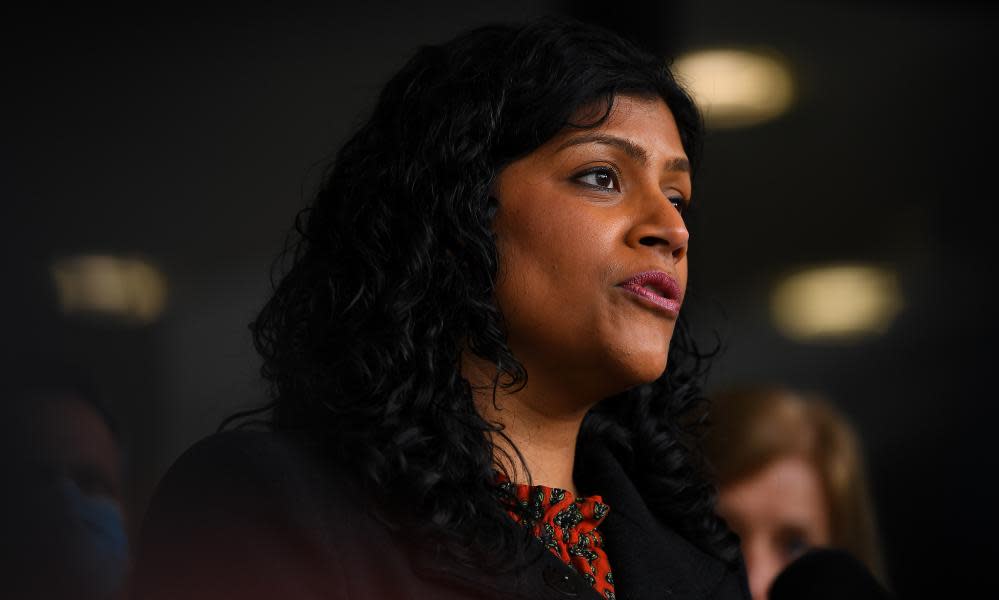Victorian Greens welcome ‘teal’ independents running in state election after historic federal result

The prospect of “teal” independents running at November’s state election has been welcomed by the Victorian Greens leader, Samantha Ratnam, who is buoyed by her party’s historic result at the federal level.
On Tuesday, Guardian Australia reported that Climate 200 is considering providing financial backing to independent candidates to run in traditionally Liberal-held state seats, which Ratnam said posed no threat to the Greens’ chances.
“The more people advocating for stronger action on climate change, on inequality and wanting to bring integrity to parliament, the better our society is for it,” Ratnam told Guardian Australia.
“We really welcome more and more people caring about these issues and putting them on their agenda. It’s such an exciting time.”
Related: ‘Teal’ independents coming for state MPs next in Victoria and NSW
On top of retaining the federal seat of Melbourne, held by party leader Adam Bandt, the Greens won the traditionally blue-ribbon Liberal seat of Ryan in Brisbane and neighbouring Griffith, formerly held by Labor prime minister Kevin Rudd.
The party was also in a strong position in the seat of Brisbane and in Macnamara, in inner-city Melbourne.
The Greens look set to have a senator in every state, which would give them a total of 12 in the upper house. Bandt has dubbed the result a “greenslide”, making the party the third most powerful in parliament.
Ratnam was hopeful the result, including a 13.3% primary vote in Victoria, would translate to success at November’s state election.
“We will be taking a close look at the results as the dust settles and we get more information over the next few weeks. People do want stronger action on climate change, they want to phase out coal and gas, tackle inequality, bring integrity back into parliament,” she said.
In Victoria, Ratnam is the Greens’ only upper house MP, while the party holds the seats of Brunswick, Melbourne and Prahran in the lower house.
Ahead of the election, the Greens were eyeing the Labor-held seats of Richmond and Northcote, the latter of which was won by the Greens candidate Lidia Thorpe in a byelection after the death of the sitting Labor MP Fiona Richardson in 2017.
Related: ‘Can’t sit in the too-hard basket’: premiers push Anthony Albanese to overhaul health system
The party had hoped to increase Thorpe’s margin at the 2018 election, but a campaign dogged by scandals over the personal background of some candidates saw it lose the seat, as well as four in the upper house, where complex preference flows between parties via group voting tickets was also a factor.
The Greens had already announced the former Yarra city council mayor and councillor Gabrielle de Vietri and public school teacher and climate advocate Campbell Gome as its candidates in Richmond and Northcote, respectively.
Ratnam said there had been a 7% swing to the Greens in the federal electorate of Cooper, which takes in Northcote. Richmond forms part of the Melbourne electorate, which Bandt won without having to rely on preferences.
“We’ll be running a really strong people-powered campaign in both those seats, as we did at the federal election and the results in Queensland speak for themselves,” she said, pointing to the Greens’ doorknocking campaign in inner Brisbane.
She is also hopeful the Victorian government will ban group voting tickets before the poll. The state is the only jurisdiction remaining that allows voters to choose just one party above the line on their upper house ballot paper, after which their preferences are allocated by the party.
“Because the Labor government has failed to reform the group voting system in the upper house, outcomes are likely to be decided by political parties, behind closed doors, rather than by the voters themselves,” Ratnam said.
Meanwhile, in the lower house, the independent MP Suzanna Sheed is continuing her campaign for a non-government business program to be reinstated.
Briefly on Tuesday morning, it appeared the government had allowed her to debate a motion on the issue and she began to speak before being instructed by the deputy speaker to sit down. It was then clarified leave to debate the motion had been denied.
“It is simply not good enough. How can we in Victoria be the only lower house in this country not to have a non-government business program? What are people afraid of?” she told parliament.

 Yahoo Movies
Yahoo Movies 
